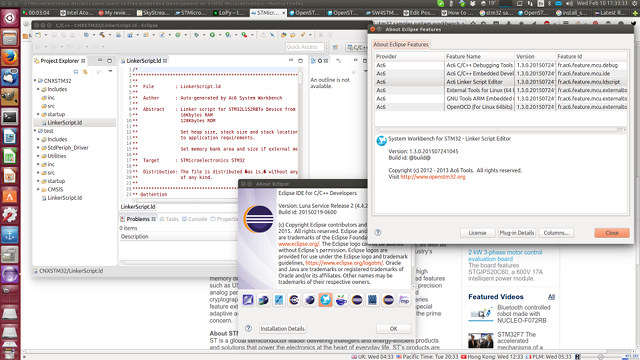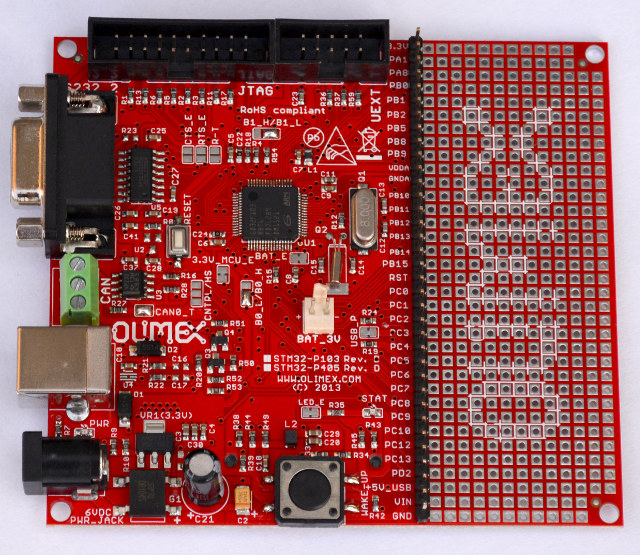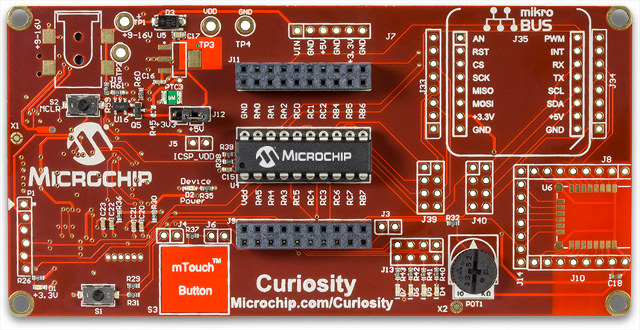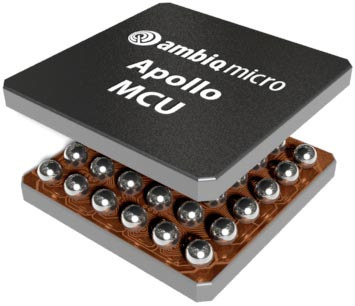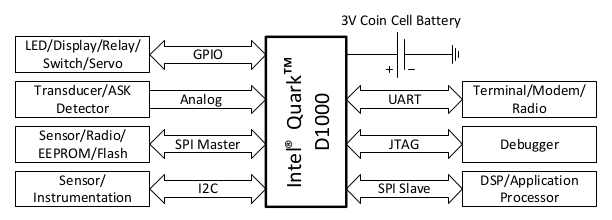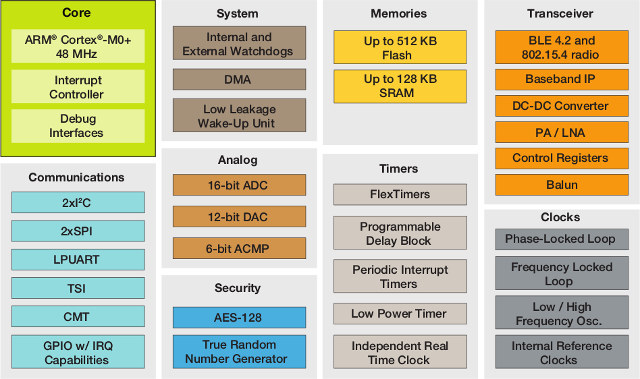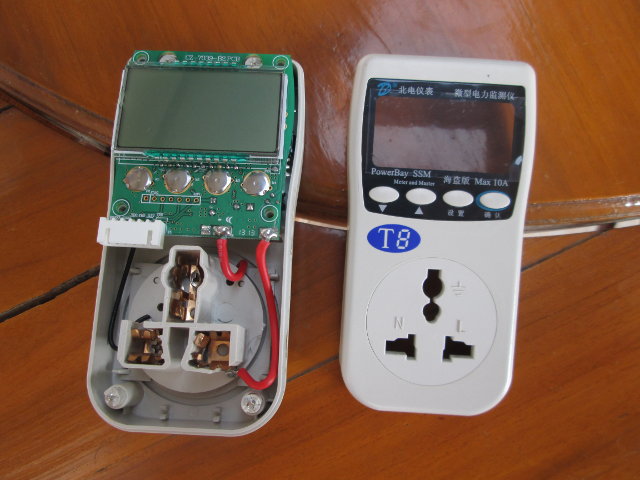Silicon Labs has introduced three new Wireless SoC families with Blue Gecko for Bluetooth Smart, Mighty Gecko for Thread & Zigbee, and Flex Gecko for proprietary 2.4 GHz protocols. All three families provides up to 19.5 dBm output power & hardware cryptography, and are pin-to-pin and software compatible. SiLabs Wireless Gecko SoC highlights: MCU Core – ARM Cortex-M4 @ 40 MHz with FPU, up to 256 KB flash, and up to 32KB SRAM. Mighty Gecko also adds a DSP Peripherals AES256/128 Hardware Crypto Accelerator ADC (12-bit, 1 Msps, 286 µA) Current DAC (4-bit, Current Source or Sink) 2x Analog Comparator Low Energy UART 2x USART (UART, SPI, IrDA, I2S) I2C (Address recognition down to EM3) Timers : RTCC, LE Timer & Pulse Counter 12-channel Peripheral Reflex System Up to 31 GPIO EFR32BG Blue Gecko Family Bluetooth Smart (Bluetooth Low Energy or “BLE”) 4.2 specification as well as proprietary wireless protocols […]
STMicro Releases Linux based STM32 MCU Development Tools
Until a few years ago, most development tools for micro-controllers were only available for Windows, but as Linux gained popularity among developers and engineers, community of developers designed development tools running in Linux, but only a few companies are providing tools that run on Linux operating systems. The good news is that STMicro has just announced the release of STM32CubeMX configurator and System Workbench for STM32, for both Linux and Windows, with Mac OS supporting coming on Q2 2016. Developped by Ac6 embedded systems company, System Workbench for STM32 relies on Eclipse IDE, supports the ST-LINK/V2 debugging tool under Linux through an adapted version of the OpenOCD project, and can be used with various STMicro STM32 boards including Nucleo boards, Discovery kits, and other Evaluation boards. You can give it a try by visiting OpenSTM32 Community, but for some reasons they ask you to register before accessing the installation instructions. […]
GigaDevice GD32 is a Faster, Software and Pin-to-pin STM32 Compatible Cortex M3 MCU
Las month, Olimex discovered a Chinese company called GigaDevice has made an STM32 clone called GD32 and compatible with STM32F103, but with higher core frequency (108MHz). Olimex has now posted an update after receiving a letter from GigaDevice, and trying GD32F103RBT6 MCU on their own STM32F103 boards. The company explained that GD32 was their own implementation, and claimed rights on GD32 trademarks, while Olimex discovered than GD32 was working just fine on their board having passed “all functional tests without any modifications”, and with all the same development tools and software code running fine. GD32F103xx datasheet (PDF / English version) can be downloaded to find a few more details: The GD32F103xx device incorporates the ARM Cortex-M3 32-bit processor core operating at 108 MHz frequency with Flash accesses zero wait states to obtain maximum efficiency. It provides up to 3 MB on-chip Flash memory and up to 96 KB SRAM memory. […]
$15 Microchip Curiosity Development Board Supports 8-bit PIC Microcontrollers
I’ve just found out Microchip had introduced Curiosity development board a little while ago, in order to let students and others experiment with their 8-bit PIC DIP MCUs, and including MikroElectronika Mikrobus footprint, an interface for Microchip RN4020 module to add Bluetooth Low Energy, as well as other headers and some extra features like buttons, and a potentiometer. Microchip Curiosity board specifications: MCU – PIC MCU socket for 8, 14, and 20-pin micro-controllers with PIC16F1619 pre-installed. Expansion mikroBUS Click Board footprint Microchip RN4020 Bluetooth Module Footprint USB – USB mini-B connector Misc – Master Clear Reset button, potentiometer, LEDs, mTouch button, push button Power Supply 5V via USB 9V using an external power supply (footprints only) 3.3V to 5V external power supply via TP3 and TP4 pins Dimensions – N/A There are over 160 MikroElektronika Click boars on the market now, but only seven are listed with code samples for […]
Ambiq Micro Apollo Low Power MCUs Promise Cortex M4F Performance at Cortex M0+ Energy Efficiency
Ambiq Micro is a US company founded in 2010 that focuses on “extremely low power” semiconductors leveraging their patented Subthreshold Power Optimized Technology (SPOT) platform. Earlier this year, they announced their first low power Cortex-M4F MCU Apollo family with claims of 5 to 10 times lower power consumption compared to other micro-controllers with the same performance. According to an EETimes article, they’ve at least partially backed their claims with a live demonstration at ARM TechCon 2015. Before checking out the test results, let’s have a look at the main features of Apollo MCU family: 32-bit ARM Cortex-M4F processor @ up to 24 MHz, with FPU, and wake-up interrupt controller with 12 interrupts Up to 512KB flash, 64-KB low-leakage RAM “Rich set of timing peripherals” Peripherals I2C/SPI master; I2C/SPI; UART; 10-bit, 13-channel, 1MS/s ADC Temperature sensor with ±2°C accuracy Voltage Range – 1.8 to 3.8V Power Consumption: active mode: 30µA/MHz (executing […]
Intel Unveils Three New Micro-controllers for IoT: Quark D1000, Quark D2000, and Quark SE
Intel’s subsidiary, Wind River, has recently announced two operating systems for the Internet of things with Rocket RTOS and Pulsar Linux supported respectively by Quark MCUs, and Intel Atom processors, as well as some ARM SoCs. But it’s not the only “IoT” announcement made by Intel in the last week, as I found out via EETimes that the company also unveiled three new Quark SoCs, namely Quark D1000, and Quark D2000, and Quark SE. Intel Quark D1000 Contrary to previous Quark processor and the upcoming D2000 and SE processors, D1000 is not compatible with x86 instructions set, and features the following: 32-bit Harvard CISC CPU @ 33 MHz with single cycle barrel shifter, two cycle multiplier, multi-cycle divider, integrated 32-bit timer, programmable interrupt controller, and JTAG debugger. 128-bit wide 32 kB code flash and 8 kB ROM 32-bit wide 8 kB SRAM and 4 kB data flash Osciallators 20-33 MHz […]
Freescale Kinetis KW41Z Wireless MCU Supports Bluetooth 4.2, Zigbee, and Thread
Freescale has unveiled a new wireless micro-controller part of their Kinetis MCU family with Kinetis KW41Z, based on an ARM Cortex M0+ core, and supporting both the latest Bluetooth 4.2 specifications, as well as a 802.15.4 radio allowing support for Zigbee and Thread. Kinetis KW41Z main features and specifications: ARM Cortex-M0+ core @ 48 MHz, with up to 512 KB Flash memory, up to 128 KB SRAM, and an integrated balun Multi Protocol Radio 2.4 GHz radio, Bluetooth Low Energy 4.2 compliant IEEE 802.15.4-2011 standard compliant radio Receiver Sensitivity (Typ.) – BLE: -96 dBm; 802.15.4: -102 dBm Programmable Transmitter Output Power up to +4 dBm I/Os – 2x I2C, 2x SPI, LPUART, TSI, CMT and GPIOs with interrupt capabilities Analog modules – 16-bit ADC, 12-bit DAC, 6-bit High Speed Analog Comparator (CMP) Security – AES-128 Accelerator (AESA), True Random Number Generator (TRNG) Operating Voltage Ranges Bypass Voltage: 1.71V to 3.6V […]
ATT7039AU Micro-controller Features an Energy Meter Unit for Power Meters
About two years ago, I purchased Northwest T8 power meter, and it worked fine for about three months, but one day the top plastic broke as as unplugged it, rubber bands prolonged its life for a few more weeks, but eventually the display stopped working, and keep it in my drawer for long while, until today, when I decided to have a closer look at how it was done. The PCB is called CZ-7039-B2, and the top includes the display, 4 user buttons, as well as JTAG through holes (P2) and 2.54mm header (P1) with TDO, TMS, GND and 3.3V signals, as well as a pin called P1600, but I still haven’t found out what it might be for. I’ve also taken the board out completely, to find out everything is basically handled by a single 48-pin chip called ATT7039AU. After a Google search, I quickly found out the chip […]



